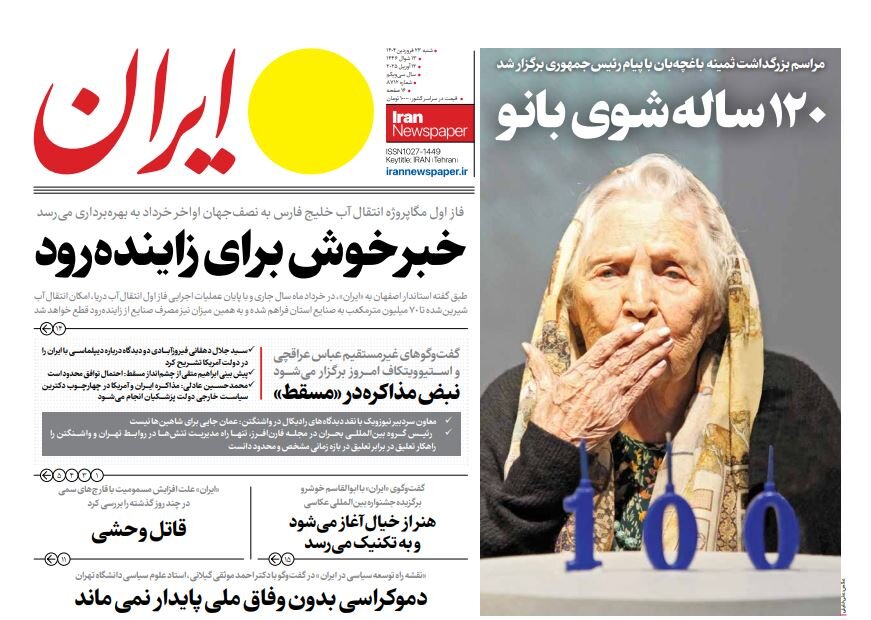Tehran – In a memo, the Iranian newspaper discussed key points for the success of new nuclear negotiations.
Princeton University researcher Seyyed Hossein Mousavian says negotiations with intermediaries and indirect negotiations should not be extended. It is faster to reach a contract through direct negotiations. There are many major differences between Iran and the US, but there is also the issue of both sharing a common interest. Steve Witkoff is one of the unique diplomats of the Trump administration, and like Trump, he calls for an agreement. Finally, the experience of former US negotiator Robert Murray should not be forgotten. Robert Marie wanted to revive the JCPOA and make a lot of effort, but the Israeli lobby was unable to tolerate him and mercilessly eliminated him. The “economic contract” is extremely important to Trump. One factor that can accelerate and maintain the agreement is the major economic contract between Iran and the United States. The Netanyahu government wants to broaden these conflicts and engage the United States in a military conflict with Iran. Therefore, the Netanyahu government uses all influential agents to fail negotiations between Iran and the United States.
Farhikhtegan: Global public opinion can only embrace existing stories
In his commentary, Fahhictegan addresses Iran’s weaknesses in the face of Trump’s media campaign, writing: One of these weaknesses is the lack of numbers that can speak on behalf of Iran at the international level. The JCPOA experience demonstrated why it is so important to have people in the media battle with the US that are trusted by the international community and able to present Iran’s message wisely and officially. Now, given this lack of tools, no matter what the outcome of the negotiations, Trump has no choice but to win himself and international public opinion has no choice but to embrace existing narratives. Today, there is a need for a campaign that includes diplomacy, media, or cultural figures who have a relatively understanding of international issues, appear in reputable global media and are able to manage the issues. A campaign that knows the general lines of Iranian messages and prepares them for delicate moments. If negotiations are underway, these numbers can announce our main and fundamental perspectives before Trump uses the results for his benefit.
Arman-e-Emrooz: Negotiation Friends and Enemies
Arman-E-Emrooz spoke with political expert Peyman Khajavi about the internal and external enemies of the negotiations between Iran and the US that began in Oman on Saturday. He said: The foundations of international relations in the modern world are based on dialogue and agreements between governments. It should be noted that Israel is a serious opponent of negotiations at the international level. Israel’s political presence is defined in a way that requires enduring hostility in the region. Therefore, this administration and its lobby have always been opposed to dialogue between Iran and the United States. It is also in the country that sees the continuation of their political life, relying on the continued tension between Iran and the United States. These groups have been standing in full cooperation with Israeli lobbies in recent years. Additionally, another movement has emerged, commonly referred to as “beneficiaries of sanctions.” These groups are taking advantage of sanctions by forming economic networks. In this situation, a realistic view of negotiations should be adopted, avoiding internal competition on national issues, and focusing on long-term national interests to achieve stability and development.
Hamshahri: What is the red line of Iran in negotiations?
The Iranian and American teams arrived in Muscat, Oman’s capital, before the afternoon of Saturday, April 12th, and began negotiations indirectly after meeting with the Omani Foreign Minister. The Omani Foreign Minister, as an intermediary, sent a message between the two sides. According to some sources, the need for American delegations to avoid using threatening language, the need to avoid framework and excessive demands by this team on the nuclear program, and the need to refrain from debating issues on Iran’s defense industry, are part of Iran’s red line, and Iran does not need to accept threats of threat under any circumstances. Iran is always ready to build confidence in the peaceful nature of its nuclear program in exchange for lifting sanctions. So, if you sincerely say that the ball is in the American courts and that Americans are only concerned about nuclear bombs, negotiations are not difficult. But if Americans enter the field hypocritical and demand too much, they must also accept international responsibility to undermine negotiations.

